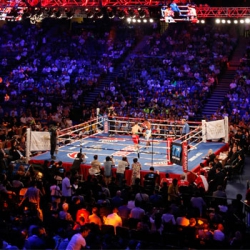
Cotai Arena Could Host Championship Fights
Macau cemented its position as the world capital of gambling by setting a new revenue record in February 2014. The combined revenues for China’s gambling enclave posted a $4.8 billion revenue stream in February, topping the previous record of $4.61 billion from October 2013.
Officials said the main reason for the bump in gambling rake is the Chinese New Year holiday. 770,000 different visitors, including many high dollar Chinese gamblers, came to the city to celebrate the new year. The numbers represented a 23% on February 2013, though the total year-on-year revenue increase for 2014 is 40.3%.
Macau’s Numbers Dwarf Those of Vegas and Singapore
Despite being the shortest month of the year, the February numbers came close to matching the revenues for Las Vegas ($6.5 billion) throughout all of 2013. The next-nearest rival was Singapore, whose totals for 2013 were $6 billion.
The statistics show that Macau handles far and away the largest amount of action each month, with an expected total revenue stream ten times larger than that of Las Vegas in 2014.
Las Vegas Sands Corp Assets
Such numbers underscore why the Las Vegas Sands Corp., which owns the Venetian and Palazzo in Las Vegas, seems more interested in land-based gambling than the nascent American online gambling industry. Their Macau properties draw in a larger total revenue stream than the Sands’s other far-flung network of casinos. In all, the Las Vegas Sands owns 5 different properties in Macau.
Venetian Macau
Their chief location is the Venetian Macau, which opened in 2007. The Venetian Macau is the largest casino on Earth, the largest single structure hotel building in Asia, and the sixth-largest structure in the world. It also draws in the most revenues of any casino in Macau.
The company also owns the The Plaza Macao and Four Seasons Hotel Macao in the Sands Cotai Central Development, along with the Four Seasons apartments in the same area. In addition to these properties, the Las Vegas Sands owns the Sands Macau Casino on the Macau Peninsula. Along with the Marina Bay Sands in Singapore and a Sands resort in Bethlehem, Pennyslvania, the gaming corporation has an estimated annual revenue of $11.1 billion per year.
Of course, Sheldon Adelson’s gaming company is not the only one collecting massive amounts of cash. Galaxy Entertainment and Crown Melco also have major gaming interests in China’s casino capital, though these companies are owned by Chinese real estate developers–not an American company.
Macau Becoming a Sports Capital
2013 saw Macau begin to take over another of Las Vegas’s traditional roles: as the center of boxing. While Macau casinos still are far behind Vegas venues like the MGM Grand and Mandalay when it comes to the number of boxing and MMA events, Macau’s CotaiArena is becoming a new option for fighters and promoters worldwide.
In May and November 2013, Manny Pacquiao moved his fights to CotaiArena (officially named “The Venetian Macao Hotel & Resort’s CotaiArena”). While the city has hosted boxing events in past year’s (such as faded heavyweight Ray Mercer’s 2008 fight), Pacquiao’s fights were seen as a turning point. Many in the business wondered if the Chinese casino operations could pull off a Vegas-style event, but the 2013 fight nights proved it was possible.
Follow the Money
Post-fight statistics showed several hundred million Chinese viewers watch the fights when staged in Macau, though the pay-per-view for a Chinese viewer is in the $5 range. Though promoters can charge 12 times more per PPV package in the United States, the numbers still favor Chinese broadcasts–and American promoters have noticed.
The Ultimate Fighting Championship also has noticed. UFC Fight Night: Kim vs. Hathaway took place in the same venue in March 2013. Though Las Vegas probably has nothing to worry about until Floyd Mayweather moves a fight to Macau, the fight game has always been about the money, so it’s only a matter of time before many of the biggest events take place in Macau.
Future of Macau’s Gambling
With 35 gambling operations in the city, the numbers continue to spiral upward. As more developments open in Cotai and as the international financial tips from West to East, it’s hard to say how large of a gap Macau might open up in the next few years.
While most of the developers are Chinese-born gaming moguls like Stanley Ho, Steve Wynn has built properties in Macau. Wynn is another American gambling CEO who is unimpressed by the onset of legalized online gambling in the USA. One must wonder whether the allure of China’s high rollers may draw the attention of men like Sheldon Adelson and Steve Wynn to their land-based properties in the Far East. With Adelson saying he’ll spend whatever it takes to keep online gambling illegal in the United States, one sees that it’s the massive influx of Chinese gambling revenues which may allow him to do just that.
